Aimee Voelz
One person to help
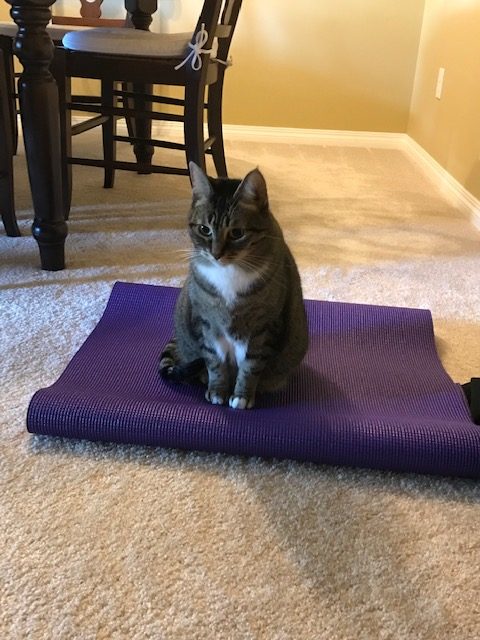
Last weekend I went to a workshop at a yoga studio. The instructor was greeting people in a different room than the small one where we were practicing, so we were left to find our own places for our mats in two rows. As more people entered the room, those of us already sitting down kept edging our mats nearer to each other to make space for them.
When the two rows seemed full, with mats closer together than what is typical, two more students arrived. Whereas at first people seemed unbothered by standing up and shuffling mats closer together three or four times, now they appeared reluctant.
This stressed me out. I imagined that the newcomers felt unwelcomed and unsure of what to do. I stood up on my mat and said lightly, I think we can make room for one more in our row. The woman on my left protested a bit, but once a few others stood up to accommodate the new people, she also moved over.
I thought about how some people in the room had seemed attuned to the needs of the group as a whole – for everyone to have a spot and to be included. Others were deep in conversations or sitting quietly with their eyes closed.
Initially I felt disappointed that not everyone seemed to care about being inclusive and welcoming. Then I realized that not everyone needs those qualities. Maybe they have other attributes that provide a benefit I couldn’t see. And besides, not everyone needed to take care of the last people to join the group. All they really needed was one person to advocate for them and a few others to cooperate.
I experienced that firsthand earlier in the day. I was picking up a very large box from the post office, and as I walked towards the exit with my arms full, a woman walked ahead and opened the door for me. I thanked her and her kindness made me happy. I didn’t need everyone in the post office to help me – I only needed one person to hold the door.
When we’re struggling with an issue at work, it can be frustrating and demoralizing when our coworkers don’t support us. One way to deal with this is to consider whether you really need your entire team’s help. Maybe you just need one ally to listen to you vent, or to brainstorm ideas with.
If you can’t find a single supportive person at your workplace, it’s time to look for another job! In the meantime, find someone outside of work to support you – a friend, a counselor, or a likeminded person in your yoga class.

Tiny steps to cope with a bad job

Earlier this week my yoga teacher asked the class to think about joy. Are we cultivating it in our lives? Our focus for the session was to infuse our practice with the feeling and expression of joy.
I’m someone who finds it easier to self-reflect than to generate the feeling of joy on-command. When asked to think about something joyful and remember how it feels, my first instinct is to think of beloved beings from my past. Namely, my grandmother and my cat Milo, neither of whom are still living – so then I feel sad.
My second instinct is to think of something wonderful that is present in my life. While I’m grateful that my current projects and personal connections generate much happiness, thinking about them in this context makes me feel a bit anxious. Because as with my grandmother and cat, I can’t help but imagine what it will be like when they’re gone.
I realized that if I want to intentionally create the feeling of happiness in a moment, I need to think about something with much lower stakes. Luckily the 2019 VMA awards just happened and the clip of Lizzo performing “Truth Hurts” and “Good as Hell” makes me smile and sing along every time (seriously…I watched it for the 20th time in 3 days and still shout “yeah!” with her at the end). Lizzo’s own video for “Truth Hurts” also makes me stop what I’m doing and dance every time I watch it.
Side note: If someone would make a mashup video of Lizzo’s “Boys” and Macklemore’s “Downtown” my life would be complete.

This experience made me think about how hard it can be to feel peace, let alone happiness, when work sucks. When you dread going to the worksite every day and come home exhausted, the negativity is overwhelming. It’s a weight that tends to stay with us even in our off hours.
It’s not easy to rise up out of the heavy feelings caused by a bad work situation but the secret is to make the tiniest effort. It is natural to focus on things that take larger amounts of time, energy and focus, like finding a new job and all the steps that go along with that…finding job listings, refreshing your LinkedIn profile, lining up references…
Landing a new job that’s a better fit is important to work towards, but it’s also important to cope in the meantime. Making sure there are moments of feeling happy and lighthearted can keep downward spirals away and reminds us that there is more to life than our jobs.
If you feel like you’re drowing in a negative work environment, try spending some time every day thinking about what little things still make you happy or are pleasurable. The tinier the better because it’s an entry point to get past feelings of anxiety, sadness, or overwhelm. Then don’t stop at the thoughts of something positive; feel it in your body, too.
Eating something you like for lunch? Awesome, enjoy what it tastes like. Focus on it. Make the most of the meal. Hot shower? It feels good to soak in the steamy air and get clean. Notice that. It doesn’t exactly feel “happy” as much as it feels relaxing and calming. That works just as well! Or like me, take 3 minutes to watch a video that makes you smile. Then you can ask yourself:
Everybody needs a break once in a while

Everybody needs to take a break once in a while.
When we’re stressed and overwhelmed with work it can be challenging to take a few hours or a few days for ourselves. But spending a little time somewhere quiet, with a nice view, is a great way to slow down and regain perspective. In the grand scheme of things, having too many difficult projects with too-short deadlines is temporary. Life is bigger than our jobs.
When work and life are flowing smoothly, it is still important to take a break every now and then. Instead of using the time to recover, we can just…be. Breathe fresh air, watch a sunset, spend a few hours looking at geese making their way up and down a shoreline. It might spark creativity. It might just be a chance to shore up energy reserves that we’ll need to draw on later.
Do you need a break?
Dying trees and new jobs

I’d hoped the tree would recover but after two years of stunted growth and increasingly bare limbs, I had to face that this wasn’t going to happen. A fungus got in the soil and the 16-year-old Japanese maple was too weakened to heal. It was sad; I had watched that red-leafed maple grow from 6 feet all the way up to the top of my second story window. I wanted to give it a chance.
I finally accepted that to have a healthy tree that will live a long time and grow to a full height, the diseased tree would have to be removed. Even part of the roots, to make room for the new planting.
I wanted to replace it with an identical tree that matched my neighbors’, but that would leave the new tree susceptible to the same infection. Instead, the arborist recommended a different species that is immune to the fungus.
I had invested a lot of time in caring for the tree and it was familiar and important to me. In the last few years it was finally tall enough to offer some shade on the hot, western side of my home. A new planting would be expensive, especially one that was partially grown. Although I had good reasons to keep my tree, or at least a replica of it, it wasn’t the smartest choice.
This is a great metaphor for a job that is no longer right for you. Just as I was invested in my tree and the shade it provided, you might be deeply enmeshed in your current role and have valid reasons why you want to stay, even though parts of your job are “diseased.”
And just as I knew that a replacement would have costs, including years of growing tall enough to provide protection from the sun, a new job often means losing some benefits and requires time to develop credibility and goodwill with new coworkers and managers.
Thinking about what you’ll give up and the risks of making a change can be paralyzing. But if I had replaced the maple when it first showed signs of damage, I would be much closer to having the shade I want for my window and balcony. Waiting didn’t change the inevitable outcome…it just raised the price of the tree with inflation and lengthened the time I’ll have to wait for it to grow tall.
If you are unhappy in your job but delay getting a new one, how much more will your confidence and stress levels continue to suffer? Bad jobs drain energy and wellbeing. It’s easier to look for a job and convince interviewers to hire you when you’re mentally and physically strong.
Back in November, I finally had the tree replaced. The new planting was about 6 feet tall but thin and bare-branched. I had a bag around the trunk to fill with water during dry weather and nurtured the heck out of that tree. It paid off. The over-wintering allowed roots to get established and by the time it started leafing, it had already grown more than a foot taller.
And then, because life is like that: PLOT TWIST!
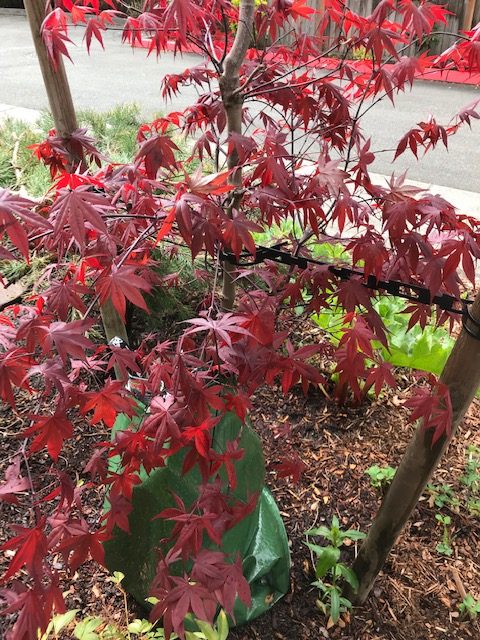
As the leaves started to develop in April, I kept remarking to my neighbors that even though it was a different species, it looked very similar to the other Japanese maples. After the third time I said this, it dawned on me that they had planted the wrong tree.
The arborist had provided two quotes back in November. One was for an “Acer Palmatum Blood Good” – a Japanese maple varietal and the other was for a Stewartia Pseudocamelia. I ordered the Stewartia but they planted the maple.
At this point, I was attached to this little tree that had been growing for months and reluctant to start over. After multiple conversations with the arborist, I agreed that the best long-term choice was to replace the maple with the Stewartia because it isn’t susceptible to the fungus in the soil. But when the day came, they called me from the nursery to double check that the green-leaved Stewartia was what I wanted.
Uh…it had been over 7 months since I first met with the arborist, but I remember seeing a picture of a red-leafed tree. On the phone, they said that the tree turns red in autumn, but is green the rest of the year.
That was enough for me to say no to the replacement.
My new tree was already established, thriving and matched the neighborhood trees. I know there’s a risk that if the limbs suffer damage, it won’t be able to fight off the fungus and I will have to replace it. It is not an ideal environment for its longevity. But right now, the young maple is healthy and beautiful, and I want to keep it. If in later years it becomes diseased, I will immediately have it replaced – with as large of a tree as possible to more quickly reach the height I want.
This is another metaphor for changing jobs. You go into a new role with expectations based on your research and what you’ve been told, but sometimes the reality is different. Your day-to-day tasks aren’t what you thought they would be. The manager who hired you leaves, and now you must get to know their successor. The organization’s priorities change, and you are asked to cancel a project or take on a new set of responsibilities.
If you end up disliking your new job, you don’t have to suffer through it. You can attempt to negotiate with your management to improve what isn’t working, especially the parts that are different from the job description you agreed to. If that doesn’t work, you can start the job search again. Just because it’s a new role doesn’t mean you are stuck with it.
Maybe, though, once the surprise has worn off after finding your new role isn’t what you anticipated, you’ll realize that it’s fine. All changes come with risk. Calculated risks are better than steadily declining in a diseased environment.
Your next job doesn’t have to be your forever job

If you feel stuck in a bad job it can be easy to lose sight of the bigger picture. You’re probably stressed, frustrated and tired. Your work conditions and how you feel can make it difficult to spend energy on anything but coping.
Wouldn’t it be nice if a letter came down your chimney containing a job offer that is perfectly suited to your interests and abilities and paid enough money that you didn’t have to worry about bills, like Harry Potter’s invitation to go to school at Hogwarts?
Many of us would be thrilled just to know what type of job would make us happy so we could start pursuing it. But if you’re depleted from your current job, you’re not in an ideal frame of mind to think of realistic possibilities. It is easier to dream about a job that you think you would love and ignore the part about needing to make a living wage and have healthcare benefits.
You don’t have to stay in your miserable job until you figure out what type of work is best for you. Your best course of action might be to just start looking for similar work somewhere else. Take your existing skills and experience and apply for jobs you’re qualified for.
Getting hired by a new employer may provide a boost of confidence along with a new setting and new coworkers. It’s a change that could give you a fresh perspective about what you like and don’t like about the work you’re doing. These insights will help you consider what it would take to have a job that makes you happy.
Your next job doesn’t have to be the perfect job that you want to stay in until you retire. It can be the next job on your journey to a fulfilling career.
It doesn’t have to be your dream job to be a great job
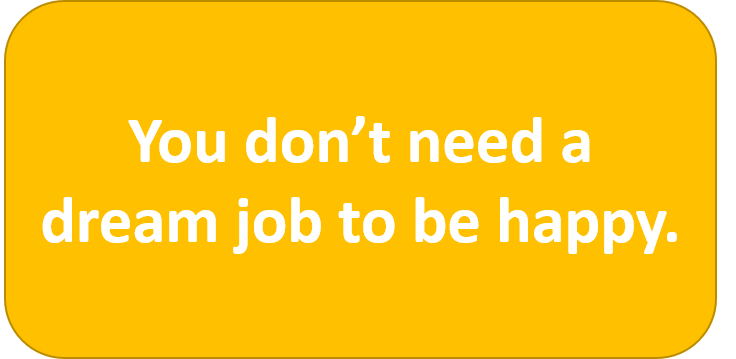
Some people feel called to a singular career. They are compelled to pursue their dream job, whether it is in the arts, sports, medicine or a niche role that the average person may never know exists.
Some of them will achieve the career success they’ve been striving for. Others might find that their passion becomes their side gig while they do something else to pay the bills.
For the rest of us? We may never have a dream job, but that doesn’t mean we won’t have satisfying careers and happy, full lives.
When I try to imagine what my dream job would be, I picture waking up in the morning full of excitement to get started on my work. After that…I draw a blank.
Granted, I’m not a morning person and it can take an hour and two cups of coffee before I feel like doing anything. But no matter what time of day, I don’t have a burning, persistent desire to do any one type of work.
And yet, I love my job.
My projects are varied and interesting. There’s always something new to learn. I like and respect the people I work with. I enjoy the flexibility of working from home. My earnings pay the bills.
I notice every day how grateful I am for the job that I have and the lifestyle it enables me to live. That includes having enough spare time to volunteer with organizations that I care about.
Volunteering gives me a mission-driven sense of fulfillment that is different from the gratification I feel when I successfully complete a work project. But if I won the lottery, I wouldn’t devote every day to my volunteer projects. I’m happy with the amount of time and energy that I’m spending in that area of my life. And I know from having tried it, that writing full-time doesn’t work for me either.
A large part of what makes my life feel full and satisfying is that I both love my career and its demands are manageable. It allows space for other meaningful pursuits.
It’s not my dream job, but it’s a great job.
If you’re worried that you’re running out of time to discover your passion and turn it into your job, I hope you realize that isn’t the only path to a fulfilling career.
Maybe you’re like me and you will find the most satisfaction by spending your time in several different fields – even if some of them are unpaid. The easiest way to discover this is by following your interests. Researching and talking to people who are involved in the fields you’re interested in are low-commitment ways of exploring what you might like. Learning what doesn’t work for you is useful information, too.
Another possibility is to start with the job you already have and see what can be improved. If you like your field but not your workplace, you can look for the same type of job at a different employer. If you’re bored, you can seek out new projects – maybe one of them will be the first step on a path to a new role.
You don’t need a dream job to be happy with your work.
Playing to our strengths

Yesterday a nonprofit that I volunteer with hosted their annual fundraising gala. I enjoy participating but I also feel a lot of stress around this event.
One issue is feeling bad for not procuring enough items for the silent auction. I didn’t procure any this year, agghh! Another is struggling to invite people to attend because I feel awkward asking. Fellow introverts: tell me you can relate!
Part of my guilt is that the agency asks board members to do these things and I hate failing to meet an expectation. This was bothering so much that I had to find a way to resolve it.
I decided to remind myself that I contribute in other ways by volunteering on a committee and spending time on other projects and programs every month. But I needed to reinforce this idea so that I fully believed it. There was still a part of me that thought “Yes you do those things, but you should also do more for the fundraiser.”
So, I shared how I was feeling with another volunteer while we were setting up the room in the morning. He said that he also has a hard time asking people for donations and that events aren’t his strong point. Then we spent a few minutes talking about a few volunteers who are very good at it: they have great event planning skills and enthusiastically seek out services and items for the auction. We are grateful for them and know how much the agency needs people like them.
But as we continued to talk, we agreed that the agency needs volunteers that offer varying strengths. We need people who are great at fundraising and events and we also need people who are good at policy, project management, public speaking, and skills that are core to the agency’s mission. We can’t all be good at everything, but we need everyone’s individual strengths to cover the components that are critical to the agency.
I’m sure I’ll continue to be nervous about helping with the gala. But I’m finally at peace with my contributions. Staying focused on my strengths is more helpful than using my available time and energy trying to be less bad at fundraising.
The same is true in our careers. Not everyone is good at talking to clients or tracking budgets or documenting processes. Making the most of our strongest abilities will have a bigger impact than being devoted to turning a weak skill into a mediocre skill.
5 Second Rule

The other day I was eating cake at my desk when I accidentally knocked the pan off the table. It landed frosting-side down on the carpet.
My first reaction was to panic in case the frosting had become smooshed into the carpet strands (it hadn’t). Then I laughed, calmly picked up crumb after crumb with my fingertips and got back to work.
I was glad I didn’t get frustrated about the mess and the time it took to clean up. I think my relief at not having to deep-clean a quarter inch of chocolate goop out of carpet fiber helped me relax and find the humor in it. But I also remember a flicker of a moment when I decided to think it was funny instead of a setback to my schedule.
Maybe the next time I have a setback with work, I’ll use that blink of time to lighten up, or steel myself, or to decide to shrug and let it go. Kind of like I did with the cake crumbs.
Leaving the Good with the Bad
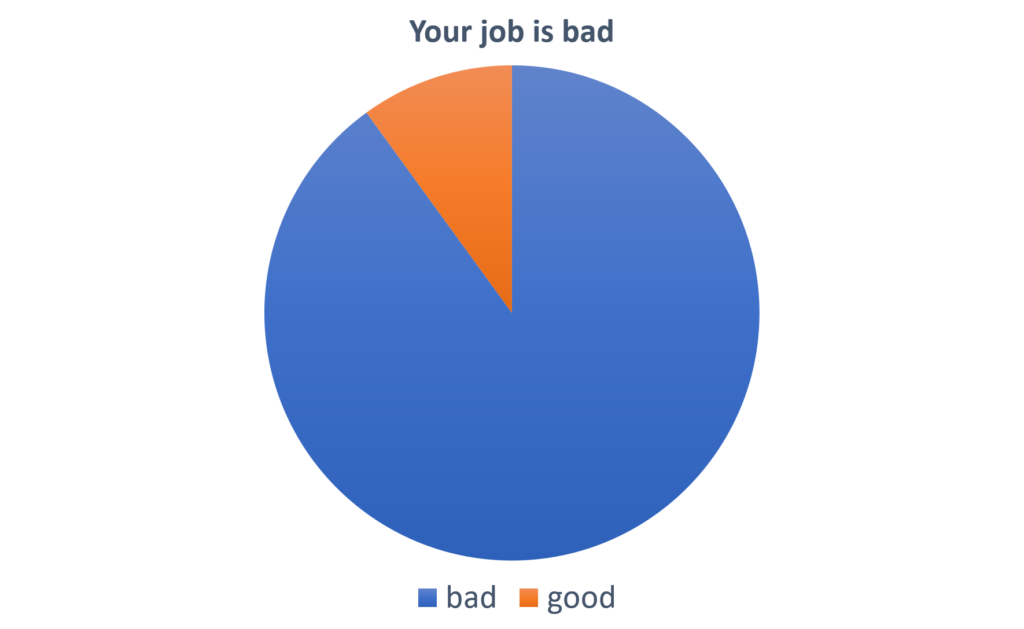 Rarely are bad jobs all bad. You might have an easy commute, nice work friends and decent wages mixed in with a nasty boss and brutal hours. One of the toughest hurdles to overcome when you are making up your mind to quit your job is accepting the loss of the good parts you will leave behind.
Rarely are bad jobs all bad. You might have an easy commute, nice work friends and decent wages mixed in with a nasty boss and brutal hours. One of the toughest hurdles to overcome when you are making up your mind to quit your job is accepting the loss of the good parts you will leave behind.
It is normal to cling to the positive parts within a bad situation. It has a purpose: it keeps you stuck in the decision-making phase, which is uncomfortable but not as scary as walking away from a significant aspect of your life and facing the uncertainties in your future.
It is also tempting to overemphasize the positive while downplaying the negative. But if you dread going to work and can’t shake off the stress when you’re done for the day, your job is bad for you. Even if you love the project you’re working on and got a raise last month, if your job makes you unhappy – it’s bad.
It’s ok to grieve your losses and be nervous about whether you’ll enjoy your next work position. Giving up something you care about isn’t easy. Deciding to let go of the good in order to be free from the bad is brave – and worth it.

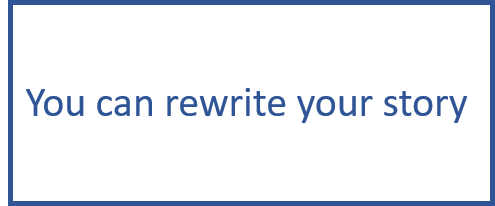
Recent Comments